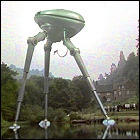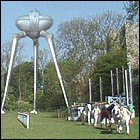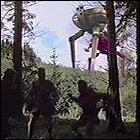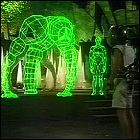
- Season 1: 1986
- Episode 1
- Episode 2
- Episode 3
- Episode 4
- Episode 5
- Episode 6
- Episode 7
- Episode 8
- Episode 9
- Episode 10
- Episode 11
- Episode 12
- Episode 13
- Episode 14
- Episode 15
- Episode 16
- Episode 17
- Episode 18
- Episode 19
- Episode 20
- Episode 21
- Episode 22
- Episode 23
- Episode 24
- Episode 25
Season 2: 1987
 Introduction
Introduction
Early in 1985, the BBC announced that it was giving its venerable science fiction series, Doctor Who, a rest – for the first time in 23 years, the show wouldn’t be a part of the BBC’s new season. It may seem irrelevant to a discussion about another series, but that fateful event is directly linked to another worthwhile British SF adventure series, The Tripods.
Based on John Christopher’s 1971 children’s novel “The White Mountains” and its two sequels, “The City Of Gold And Lead” and “The Pool Of Fire”, The Tripods was the BBC’s attempt to mount another serious science fiction series, though this time with higher production values and perhaps more grounded in something resembling modern-day reality than its long-running counterpart. In both the novels and the series, Earth in the future has been invaded by the Tripods, towering three-legged mechanical vessels captained by an alien race to whom Earth’s atmosphere is poisonous. Not long after  their initial invasion, the Tripods – controlled by aliens known only as The Masters – captured large numbers of Earthlings and subjected them to a process called capping. By the beginning of the books and series, capping and the dominance of the Tripods have become perfectly normal parts of Earth life. When a human comes of age, a Tripod will appear near his home village (Earth society having reverted to the steam age when the Masters confiscated and destroyed any space-age technology). In a ceremonial ritual, the post-pubescent human surrenders himself to the Tripod and is returned several hours later, his or her head shaven clean and “capped” with a metallic implant rendering them docile to the Tripods’ will. Due to the hormonal changes of puberty, humans cannot be capped at an earlier age.
their initial invasion, the Tripods – controlled by aliens known only as The Masters – captured large numbers of Earthlings and subjected them to a process called capping. By the beginning of the books and series, capping and the dominance of the Tripods have become perfectly normal parts of Earth life. When a human comes of age, a Tripod will appear near his home village (Earth society having reverted to the steam age when the Masters confiscated and destroyed any space-age technology). In a ceremonial ritual, the post-pubescent human surrenders himself to the Tripod and is returned several hours later, his or her head shaven clean and “capped” with a metallic implant rendering them docile to the Tripods’ will. Due to the hormonal changes of puberty, humans cannot be capped at an earlier age.
Nor does the process work with everyone: those with mental imbalances may receive a cap, but the implant doesn’t give the Tripods control or access to the recipient’s brain. These “vagrants” are cast out of society and left to fend for themselves; pre-capping children and teenagers are taught to fear them. One such vagrant, calling himself Ozymandias, befriends the young heroes of the books and TV series, giving them an alternative to capping: with his assistance, they can run away from home and, after a series of travels and travails through a sort of underground railroad, join the Free Men mounting a resistance against the aliens.
 Given a higher budget than Doctor Who, The Tripods managed to deliver some truly impressive spectacles for mid-80s TV on either side of the Atlantic. Wisely recognizing the limitations of BBC special effects, the series producers opted for a “less is more” approach, seldom showing an entire Tripod in a composite model shot with live action footage. For any shots where forced-perspective models were impractical, large individual legs were constructed and shown as either immobile set pieces, or were hefted with a heavy crane if the Tripod they portrayed was in motion (seen perhaps most effectively in the first episode). Lush location shooting also expanded the show’s canvas – unlike Doctor Who, The Tripods seldom suffered from a claustrophobic, studio-bound feel.
Given a higher budget than Doctor Who, The Tripods managed to deliver some truly impressive spectacles for mid-80s TV on either side of the Atlantic. Wisely recognizing the limitations of BBC special effects, the series producers opted for a “less is more” approach, seldom showing an entire Tripod in a composite model shot with live action footage. For any shots where forced-perspective models were impractical, large individual legs were constructed and shown as either immobile set pieces, or were hefted with a heavy crane if the Tripod they portrayed was in motion (seen perhaps most effectively in the first episode). Lush location shooting also expanded the show’s canvas – unlike Doctor Who, The Tripods seldom suffered from a claustrophobic, studio-bound feel.
But very much like Doctor Who, The Tripods did become a victim of BBC politics, ratings, and a changing of the corporate guard. After spending two seasons gathering an audience largely by word of mouth, and gaining acclaim for faithfully following and logically expanding on Christopher’s novels, The Tripods fell not to a human resistance, but to BBC cancellation. And sadly enough, this ended the series on a second-season cliffhanger which was always intended to be followed up by a third year. The conclusion to the story was, and always had been, available in print, but for fans not acquainted with the novels, that still wasn’t satisfactory.
 That “curse” has followed The Tripods through to the 21st century, where the first season was released in its entirety on DVD – and the release of the second year is still in limbo as a result of rights disputes between BBC Worldwide and Second Sight, the company behind the first season’s DVD release. Again, the second season had previously been available on VHS, but digital videophiles had to wait until the end of the decade for the BBC to issue its own DVD edition of The Tripods, this time with both seasons and bonus material showing the development work that had been carried out in advance of the abandoned third year.
That “curse” has followed The Tripods through to the 21st century, where the first season was released in its entirety on DVD – and the release of the second year is still in limbo as a result of rights disputes between BBC Worldwide and Second Sight, the company behind the first season’s DVD release. Again, the second season had previously been available on VHS, but digital videophiles had to wait until the end of the decade for the BBC to issue its own DVD edition of The Tripods, this time with both seasons and bonus material showing the development work that had been carried out in advance of the abandoned third year.
There have, however, been new additions to the books. Inspired by the revival of interest in his work, John Christopher wrote a prequel novel, When The Tripods Came, published alongside new reprints of the original books now subtitled “The Tripods Trilogy.”
And what of prospects of picking up The Tripods where it left off? It’s not likely. The main actors have all aged well past the pre-teen characters they were portraying in the original series; even an audio revival (seemingly the medium of choice for reviving British SF series unlikely ever to set foot in a TV studio again) would be complicated by the fact that the actors, now grown, no longer sound like teenagers. There is word that the rights for a feature film version of The Tripods may be snatched up by Disney, but there’s also fear that the distinctly Anglo-European feel of the books and TV show will be lost in that event.
